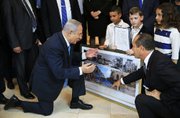JERUSALEM -- Israel on Sunday kicked off festivities to celebrate the opening of the new U.S. Embassy in Jerusalem, even as it bolstered its forces along the Gaza border and in the West Bank in anticipation of mass Palestinian protests.
A day before the embassy's formal opening, Israel hosted a gala at its Foreign Ministry with President Donald Trump's daughter Ivanka; her husband, Jared Kushner; Treasury Secretary Steven Mnuchin; billionaire casino magnate Sheldon Adelson; members of the U.S. Congress; and Jewish and evangelical Christian leaders.
Prime Minister Benjamin Netanyahu praised Trump's "bold decision" in upending decades of U.S. policy by recognizing Jerusalem as Israel's capital. "It's the right thing to do," a smiling Netanyahu told the jubilant crowd.
Trump, who during his campaign vowed to move the embassy from Tel Aviv, will address the designation ceremony's attendees via videoconference, according to two U.S. officials. Ivanka Trump, Kushner, Mnuchin and Deputy Secretary of State John Sullivan will be among the U.S. delegation.
Trump announced his decision on Jerusalem in December, triggering a joyous reaction from Netanyahu's nationalist government. The move infuriated the Palestinians, who claim Israeli-annexed east Jerusalem as their capital.
Palestinian President Mahmoud Abbas halted ties with the Trump administration and declared the U.S. unfit to remain in its role as the sole mediator in peace talks.
Israel's police force is beefing up its presence around the city, with 1,000 officers tasked with providing security for the embassy opening, spokesman Micky Rosenfeld said. They include anti-terrorism units, undercover officers and paramilitary border police, with special attention being paid to Arab neighborhoods near the new embassy site, he said. Protests are planned there at the same time as the embassy opening.
The U.S. expects about 800 people to attend today's opening ceremony, U.S. Ambassador David Friedman said on a call with reporters Friday. Like other U.S. officials, Friedman insisted the move will help the peace process.
The embassy's opening comes amid heightened tensions across the region. Israeli forces have stepped up attacks on Iranian targets in neighboring Syria over the past week, after saying Tehran-backed troops targeted Israel with a missile barrage. Iranian officials rejected that accusation and are fuming about Trump's decision to withdraw from the 2015 nuclear deal between Iran and five world powers.
The Hamas movement, which controls the Gaza Strip, has been staging a series of weekly demonstrations against a crippling Israeli-Egyptian blockade of the territory. Those protests are to climax today, with tens of thousands of people expected to gather along the Israeli border in an event timed to coincide with the U.S. Embassy move.
Hamas has signaled that large crowds, numbering perhaps in the thousands, might try to break through the border fence to realize the "right of return" to lost homes.
Both the embassy move and the protests have symbolic timing. Trump has said the opening is meant to coincide with the 70th anniversary of Israel's establishment. The Palestinian protesters also mark the date as the anniversary of their "naqba," or catastrophe, when hundreds of thousands of people fled or were forced from their homes in 1948.
About two-thirds of Gaza's 2 million people are descendants of Palestinian refugees.
A mass border breach could trigger lethal Israeli force. Forty-two Palestinians have been killed and over 1,800 have been wounded by Israeli fire since the weekly protests began March 30. The United Nations, European Union and rights groups have accused Israel of using excessive force against unarmed protesters.
Israel says it is protecting a sovereign border and accuses Hamas of using the unrest to plan and carry out attacks. Marchers have thrown stones and burned tires at the fence and flown flaming kites over it to try to set Israeli fields on fire.
WARNING TO GAZANS
The Israeli military announced that it bolstered forces on the Gaza border with combat battalions, special units, intelligence forces and snipers. Israeli warplanes also dropped leaflets in Gaza, urging residents to stay far from the fence.
"You deserve a better government. You deserve a better future," the leaflets said. "Do not approach the security fence nor participate in the Hamas display that is putting you in risk."
A high-ranking delegation of Gaza's Hamas rulers headed to Egypt on Sunday amid diplomatic efforts aimed at containing the rally. But one of the Hamas participants, Khalil al-Hayya, said there were no breakthroughs and that the march would go on as planned today.
The army said it was also reinforcing its troops in the West Bank with several combat battalions and intelligence units in case of unrest there.
On Friday, a Palestinian crowd attacked the main cargo crossing between Israel and Gaza, disrupting shipments of cooking fuel, gasoline and building materials, and causing millions of dollars in damage. Israeli officials closed the Kerem Shalom crossing and said it could take weeks or months to repair it.
The closure of the crossing creates new hardships for Gaza's 2 million people, who have endured the fallout from 11 years of blockade, including just a few hours a day of electricity.
With a heavy reliance on generators, a shortage of diesel fuel needed to run them would be sharply felt in Gaza.
Gaza's 13 public hospitals have enough diesel fuel for generators for a week to 10 days, said Mahmoud Daher of the World Health Organization. In 14 clinics run by nongovernmental organizations, supplies might only last for four or five days, he added.
"Coupled with the existing shortage of medicine and drugs and other materials needed by the Health Ministry, this will add another burden on the already overstretched health sector," he said.
Gaza is also running low on cooking gas, said Samir Hamada, the head of the association of cooking gas vendors.
Gaza needs about 350 tons of cooking gas daily, but only about 300 tons are still available at private sales outlets, he said. Hamas ordered sales to stop while it assesses the shortage, he said.
Starting today, people can only get their cylinders filled halfway to make the most of the available amounts, he said.
CHOOSING SIDES
Earlier Sunday, Netanyahu told his Cabinet that there would be a "series of decisions" to build up Jerusalem, including its contested eastern sector. Shortly after, the government approved construction of a $57 million cable car system that would link west Jerusalem to the Old City.
Although Trump has said his declaration does not set the final borders of the city, his recognition of Jerusalem as Israel's capital has been perceived by Israelis and Palestinians as taking Israel's side in the most sensitive issue in their conflict. Only two countries, Guatemala and Paraguay, have said they will follow suit. Most countries maintain embassies in Tel Aviv, saying the Jerusalem issue must first be resolved.
In a reflection of the deep sensitivities, dozens of countries -- including Britain, France and Germany -- skipped Sunday night's celebration at the Israeli Foreign Ministry.
Jeremy Ben-Ami, president of J Street, a liberal pro-Israel group in the U.S., expressed concern that the embassy move would backfire.
He accused the White House of putting the interests of a small group of hard-liners ahead of the larger interest of promoting peace with the Palestinians.
"Making a move like this removes the U.S. as a credible mediator," he said.
Ayman Odeh, the leader of the Arab faction in Israel's parliament, said that "this one-sided move strengthens Israel's occupation and takes us further from peace."
The Palestinian ambassador to Washington sharply condemned the relocation of the U.S. Embassy in a statement Sunday.
"Tragically, the US administration has chosen to side with Israel's exclusivist claims over a city that has for centuries been sacred to all faiths," said Husam Zomlot.
Information for this article was contributed by Josef Federman, Josh Lederman and Fares Akram of The Associated Press; by Nick Wadhams and Jonathan Ferziger of Bloomberg News; and by Loveday Morris, Ruth Eglash and Hazem Balousha of The Washington Post.
A Section on 05/14/2018



